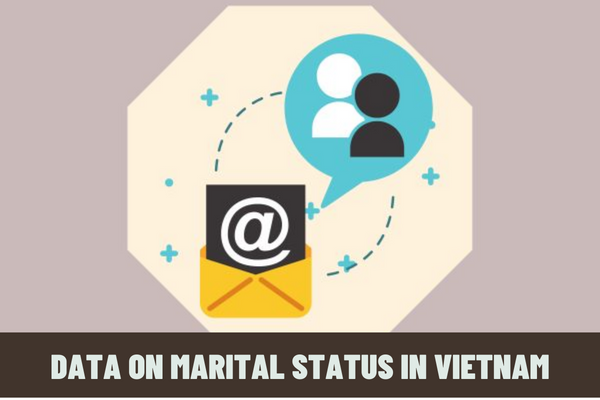Does personal data include marital status? How to handle violations against regulations on data on marital status in Vietnam?
Does personal data include marital status?
Pursuant to the provisions of Clause 1, Article 2 of Decree No. 13/2023/ND-CP, personal data is defined as follows:
“Personal data” refers to electronic information in the form of symbols, letters, numbers, images, sounds, or equivalences associated with an individual or used to identify an individual. The personal data includes general personal data and sensitive personal data.
According to that, for general personal data, Clause 3, Article 2 of Decree No. 13/2023/ND-CP has the following provisions:
Definition of terms
…
3. General personal data includes:
a) Last name, middle name and first name, other names (if any);
b) Date of birth; date of death or going missing;
c) Gender;
d) Place of birth, registered place of birth; place of permanent residence; place of temporary residence; current place of residence; hometown; contact address;
dd) Nationality;
e) Personal image;
e) Phone number; ID Card number, personal identification number, passport number, driver’s license number, license plate, taxpayer identification number, social security number and health insurance card number;
h) Marital status;
i) Information about the individual’s family relationship (parents, children);
k) Digital account information; personal data that reflects activities and activity history in cyberspace;
l) Information associated with an individual or used to identify an individual other than that specified in Clause 4 of this Article.
Thus, according to the above regulations, marital status is one of the personal data belonging to the group of general personal data and is protected by law.
Does personal data include marital status? How to handle violations against regulations on data on marital status in Vietnam?
What rights do citizens have regarding data on marital status in Vietnam?
Pursuant to Article 9 of Decree No. 13/2023/ND-CP, personal data subjects have 11 rights related to their data.
To be specific:
Data subject’s rights
1. Right to be informed
The data subject has the right to be informed of his/her personal data processing, unless otherwise provided for by law.
2. Right to give consent
The data subject has the right to give consent to the processing of his/her personal data, other than cases specified in Article 17 of this Decree.
3. Right to access personal data
The data subject has the right to access his/her personal data in order to look at, rectify or request rectification of his/her personal data, unless otherwise provided for by law.
4. Right to withdraw consent
The data subject has the right to withdraw his/her consent, unless otherwise provided for by law.
5. Right to delete personal data
The data subject has the right to delete or request deletion of his/her personal data, unless otherwise provided for by law.
6. Right to obtain restriction on processing
a) The data subject has the right to obtain restriction on the processing of his/her personal data, unless otherwise provided for by law.
b) The restriction on the processing of personal data shall be implemented within 72 hours after receiving request of the data subject, and all personal data that the data subject requests the restriction, unless otherwise provided for by law.
7. Right to obtain personal data
The data subject has the right to request the Personal Data Controller and the Personal Data Controller-cum-Processor to provide him/her with his/her personal data, unless otherwise provided for by law.
8. Right to object to processing
a) The data subject has the right to object to the Personal Data Controller and the Personal Data Controller-cum-Processor processing his/her personal data in order to prevent or restrict the disclosure of personal data or the use of personal data for advertising and marketing purposes, unless otherwise provided for by law.
b) The Personal Data Controller and the Personal Data Controller-cum-Processor shall comply with the data subject’s request within 72 hours after receiving the request, unless otherwise provided for by law.
9. Right to file complaints, denunciations and lawsuits
The data subject has the right to file complaints, denunciations and lawsuits as prescribed by law.
10. Right to claim damage
The data subject has the right to claim damage as prescribed by law when there are violations against regulations on protection of his/her personal data, unless otherwise agreed by parties or unless otherwise prescribed by law.
11. Right to self-protection
The data subject has the right to self-protection according to regulations in the Civil Code, other relevant laws and this Decree, or request competent agencies and organizations to implement civil right protection methods according to regulations in Article 11 of the Civil Code.
Thus, as a rule, for data on marital status, citizens have the above-mentioned rights.
How to handle violations against regulations on data on marital status in Vietnam?
Pursuant to the provisions of Article 4 of Decree No. 13/2023/ND-CP, in case agencies, organizations and individuals that commit violations against regulations on protection of personal data, they may:
- Be disciplined; or
- Face administrative penalties; or
- Criminal prosecution.
Thus, depending on the severity of their violations, agencies, organizations and individuals that commit violations against regulations on an individual's marital status may be handled differently. In which, the highest level is criminal handling.
Decree No. 13/2023/ND-CP takes effect from July 1, 2023.
LawNet
